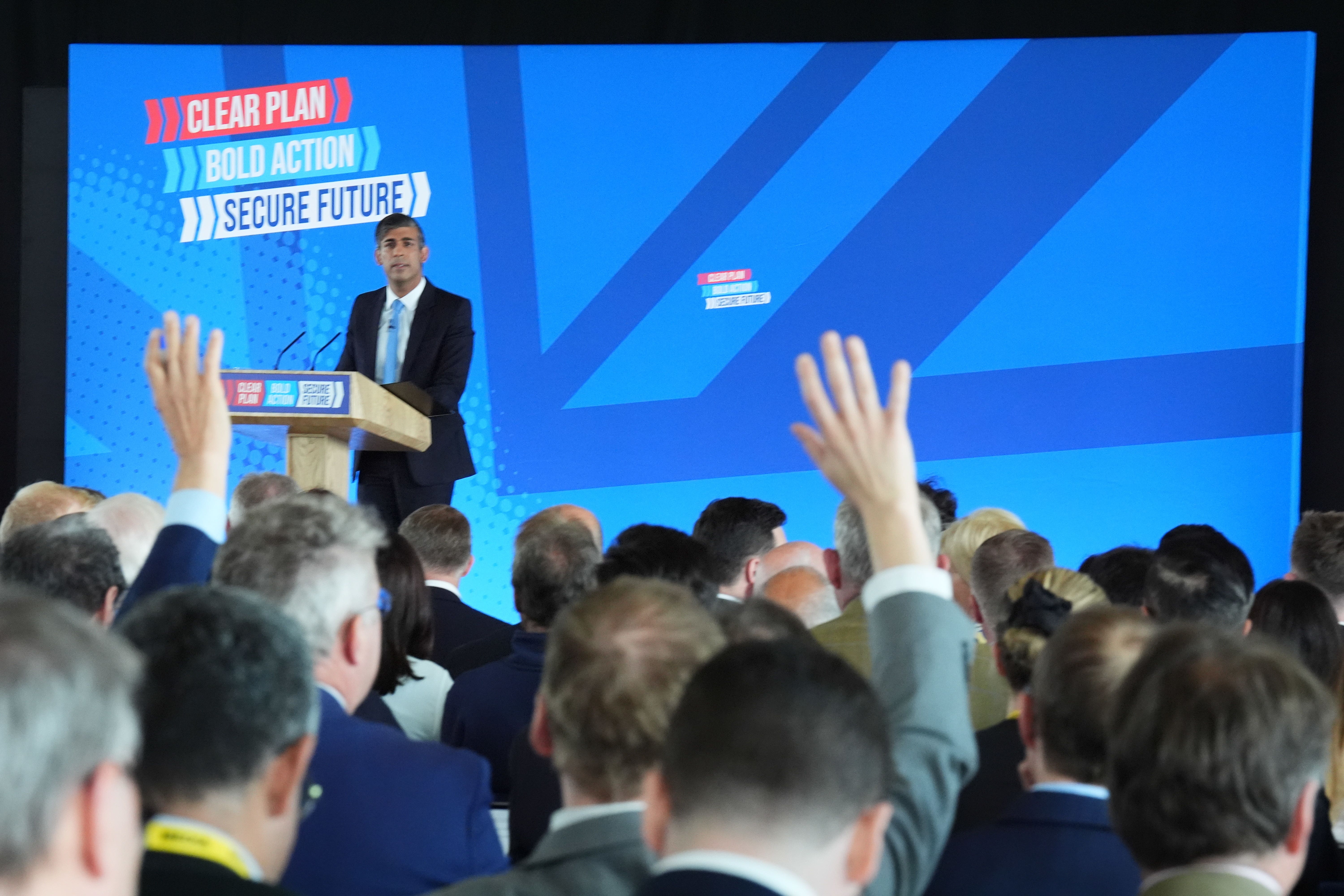The Tory manifesto raises more questions than answers – here are 20 of the biggest
The Conservatives have made plenty of criticisms of Labour’s pledges, but their own manifesto is an unfunded wishlist of unworkable policies, writes Labour’s national campaign coordinator Pat McFadden


Now that the Conservatives have launched their manifesto and seen it fall flat, we know the already chaotic Tory operation will get even more desperate in the last two weeks of the campaign.
On a daily basis, they are now peddling ludicrous fantasies to the media about “secret plans” that aren’t in Labour’s manifesto, having failed to land any legitimate attacks about what is.
When asked about the Tories’ tax claims, even the editor of The Spectator said today: “They seem to think they’ve got a licence to lie during election campaigns.”
The real reason they want to spend the next two weeks talking about invented Labour plans is that they cannot answer any questions about the massive holes in their own – particularly the unfunded commitments that could lead to a £4,800 hike in family mortgages.
They know the money isn’t there for their plans, and those are the questions we will continue to demand they address.
In the days leading up to 4 July, the question for everyone else covering this election campaign is whether to allow these Tory fantasies to be taken seriously, and if so, whether it is acceptable to allow Tory spokespeople to continue getting away – as Laura Trott did on Thursday – without any questions regarding the reality of the Tories’ own plans.
Below are just 20 questions that the Tories must be asked to answer:
1. How much of the £12bn in welfare savings announced in the Tory manifesto is already in the baseline for the public finances? In other words, what proportion of that £12bn is new money that the Tories can use to fund their other manifesto pledges, and how much has already been banked in previous Budgets?
2. On those £12bn of welfare savings, the IFS (Institute for Fiscal Studies) has said: “Most of the measures that the Conservatives have announced ... are existing government policy. They cannot be expected to deliver reductions in spending relative to the latest forecasts, since those forecasts are already predicated on most of these policies happening.” Is the IFS wrong?
3. If the Tories claim that some of that £12bn does indeed represent new money to fund their pledges on national insurance, stamp duty, and so on, can they specify which of their proposed measures on welfare spending is expected to generate that new money, and how exactly those measures will be delivered?
4. On one specific item, the government delayed the rollout of universal credit in 2022 and said this would save the taxpayer money as less would need to be spent on transitional protections for claimants. Now the Tory manifesto says they will save the taxpayer money by accelerating the rollout of universal credit. How can both of those things be true?
5. The Tory manifesto pledges to match Labour’s plan to save £6bn by cracking down on tax avoidance, but they have also included that sum in their criticism of Labour’s planned “tax rises”. Do they think collecting unpaid tax represents a tax rise? And if so, does that mean their own pledge to cut £6bn in tax avoidance represents a tax rise as well?
6. The Tories have also described Labour’s proposal to close the non-dom inheritance tax loophole as another “tax rise”. If Labour’s proposed action in this area is a tax rise, was the same true of Jeremy Hunt’s announcements on non-doms in the March Budget?
7. The Tory manifesto says that, in order to save £6bn from tax avoidance, they will invest in new technology such as AI and hire additional HMRC staff, but they don’t say how much that will cost. So how much will it cost to generate the £6bn of savings, and aren’t Labour being more prudent than the Tories by including those costs in their manifesto?
8. The Tory manifesto says they will save £1bn by “bringing quango spending under control”. Can they name a single government agency that will see its budget cut as part of this savings plan, and can they say by how much its budget will be cut?
9. The Tory manifesto says they will fund 100,000 new apprenticeships by ending the “worst-performing university courses”, but if there is no cap on student numbers, and students who would have applied for the worst-performing courses are free to apply for other courses that have not lost their funding, how will this proposal raise £1bn?
10. The Tory manifesto costings assume £1.5bn of annual savings from reforming the rail system in line with the 2021 Shapps-Williams white paper. When Labour’s rail plan estimated similar savings from efficiency, transport secretary Mark Harper said it was “unfunded”. Do the Tories now agree that rail reform can deliver significant savings for the taxpayer?
11. In their national service manifesto pledge, the Tories said that 30,000 18-year-olds would do a “a year-long, full-time placement in the armed forces or cyber defence”. The next day, Grant Shapps said: “It’s not ... 30,000 people for an entire year. It’s 25 days a year for those 30,000.” Which is right, the manifesto or the defence secretary?
12. The Tory manifesto says the national service scheme would cost £2.5bn per year, and that the military service option would be “competitive and paid, so our armed forces recruit and train the brightest and the best”. How much does it cost to provide training, pay, accommodation and equipment for 30,000 18-year-olds every single year?
13. For the other 750,000 18-year-olds who will be forced to do civic service each year, the three examples of roles highlighted in the manifesto were special constable, NHS responder, and RNLI “volunteer”. For any one of those examples, can they say how much it costs to train and equip someone up to the standard necessary to do any actual work in those roles?
14. If the national service option costs more than the Tories have said, and eats up all of their proposed savings from tax avoidance, do they accept that means there is no money to fund their other pledges from that pot: the age-related allowance for pensioners; the extra money for towns; and the increase in the child benefit tax charge?
15. The national service scheme is also partly funded through the abolition of the shared prosperity fund in three years’ time. Can the Conservatives guarantee that there is no region or nation of the United Kingdom that will receive a lower amount of funding as a result of the switch from the shared prosperity fund to the national service scheme?
16. The Tories have accused Labour of having “secret plans” for tax rises based on changes that were baked into the public finances at Jeremy Hunt’s last Budget, and which Labour have made no commitment to reverse. By that same logic, would it be fair to accuse the Tories of having secret plans to raise fuel duty, air passenger duty, and council tax?
17. Flowing from the above, is it still the plan of this Conservative government – as baked into the public finances at Jeremy Hunt’s last Budget – to raise fuel duties in March next year by 5p a litre plus inflation? Can they confirm that, under their plans, every motorist in the country will be facing that increase in fuel duty in just nine months’ time?
18. The Tories have accused Labour, without any foundation, of planning a tax on frequent flyers, but isn’t the reality that – under the Tories’ own current plans – revenues from air passenger duty are set to rise by 7.1 per cent a year up to 2029, which the OBR (Office for Budget Responsibility) says will be “driven by increasing passenger numbers and higher duty rates”? Is the OBR wrong?
19. The baseline set out in Jeremy Hunt’s last Budget also assumes an annual 4.8 per cent rise in council tax up to 2029. So based on the Conservative Party’s own logic, if Tory spokespeople cannot rule out those increases in council tax, does that not mean they have a secret plan to raise council tax by 4.8 per cent every year in the next parliament?
20. Finally, Rishi Sunak has tried throughout this campaign to use policy costings produced by Treasury officials, on the basis of assumptions provided by Tory special advisers, to justify his lies about the cost of Labour’s plans. Why did he not ask the Treasury to produce costings for his own proposals on welfare savings, tax avoidance, national service, the shared prosperity fund, apprenticeships, and cuts in quango spending?
While there are many other issues to be raised about the Conservative manifesto, what all of the 20 questions above have in common is that they go to the heart of whether the Tories have produced the same kind of credible, serious, fully costed manifesto that Labour has put forward in this campaign. Or have they instead presented an uncosted, unfunded, undeliverable wishlist of pledges that would repeat all the mistakes made by Liz Truss, and leave families facing a £4,800 hike in their mortgages as a result?






Join our commenting forum
Join thought-provoking conversations, follow other Independent readers and see their replies
Comments